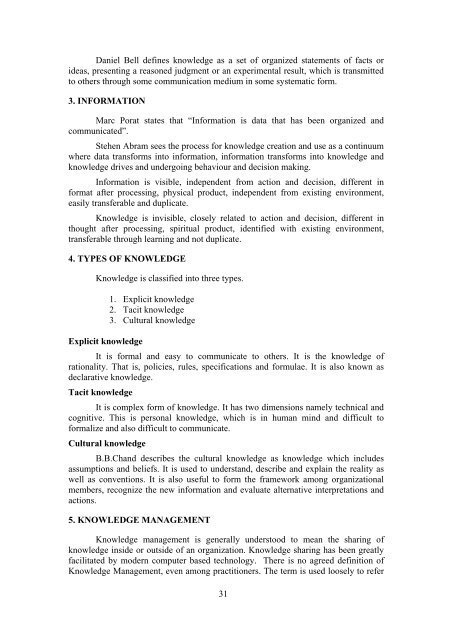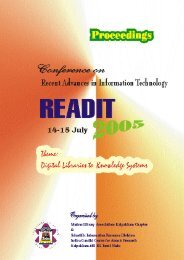READIT-2007 - Indira Gandhi Centre for Atomic Research
READIT-2007 - Indira Gandhi Centre for Atomic Research
READIT-2007 - Indira Gandhi Centre for Atomic Research
Create successful ePaper yourself
Turn your PDF publications into a flip-book with our unique Google optimized e-Paper software.
Daniel Bell defines knowledge as a set of organized statements of facts or<br />
ideas, presenting a reasoned judgment or an experimental result, which is transmitted<br />
to others through some communication medium in some systematic <strong>for</strong>m.<br />
3. INFORMATION<br />
Marc Porat states that “In<strong>for</strong>mation is data that has been organized and<br />
communicated”.<br />
Stehen Abram sees the process <strong>for</strong> knowledge creation and use as a continuum<br />
where data trans<strong>for</strong>ms into in<strong>for</strong>mation, in<strong>for</strong>mation trans<strong>for</strong>ms into knowledge and<br />
knowledge drives and undergoing behaviour and decision making.<br />
In<strong>for</strong>mation is visible, independent from action and decision, different in<br />
<strong>for</strong>mat after processing, physical product, independent from existing environment,<br />
easily transferable and duplicate.<br />
Knowledge is invisible, closely related to action and decision, different in<br />
thought after processing, spiritual product, identified with existing environment,<br />
transferable through learning and not duplicate.<br />
4. TYPES OF KNOWLEDGE<br />
Knowledge is classified into three types.<br />
1. Explicit knowledge<br />
2. Tacit knowledge<br />
3. Cultural knowledge<br />
Explicit knowledge<br />
It is <strong>for</strong>mal and easy to communicate to others. It is the knowledge of<br />
rationality. That is, policies, rules, specifications and <strong>for</strong>mulae. It is also known as<br />
declarative knowledge.<br />
Tacit knowledge<br />
It is complex <strong>for</strong>m of knowledge. It has two dimensions namely technical and<br />
cognitive. This is personal knowledge, which is in human mind and difficult to<br />
<strong>for</strong>malize and also difficult to communicate.<br />
Cultural knowledge<br />
B.B.Chand describes the cultural knowledge as knowledge which includes<br />
assumptions and beliefs. It is used to understand, describe and explain the reality as<br />
well as conventions. It is also useful to <strong>for</strong>m the framework among organizational<br />
members, recognize the new in<strong>for</strong>mation and evaluate alternative interpretations and<br />
actions.<br />
5. KNOWLEDGE MANAGEMENT<br />
Knowledge management is generally understood to mean the sharing of<br />
knowledge inside or outside of an organization. Knowledge sharing has been greatly<br />
facilitated by modern computer based technology. There is no agreed definition of<br />
Knowledge Management, even among practitioners. The term is used loosely to refer<br />
31

















